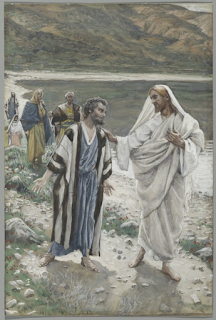 |
| Hananiah confronting Jeremiah - St. Takla.org |
TO CHEW ON: “‘As for the prophet who prophesies of peace, when the word of the prophet comes to pass, the prophet will be known as the one whom the LORD has truly sent.’” Jeremiah 28:9
In today’s reading, we witness a showdown between two prophets, Jeremiah and Hananiah. The drama becomes even more tense when we’re aware of its context.
Nebuchadnezzar, Babylon’s king, was gaining power. His army had already swept into Jerusalem and taken away many temple accessories. He was adding other nations to his kingdom as well. In Jeremiah 27:2, God told Jeremiah to put on “bonds and yokes” to symbolize Judah’s subservience to Babylon. And God told Jeremiah to advise the people not to resist Nebuchadnezzar, for those nations that “bring their necks under his yoke” would be able to stay in their land - Jeremiah 27:11.
There were more prophets than Jeremiah in Judah. They were obviously contradicting what Jeremiah had said, because at least four times in Jeremiah 27 God told him not to listen to these prophets (Jeremiah 27:9, 14, 16, 17).
In Jeremiah 28, then, we witness a showdown between one of the nay-saying prophets, Hananiah, and Jeremiah. Who was Hananiah?
- He was born of good prophetic stock - Jeremiah 28:1.
- He sounded like a prophet with his “Thus says the Lord” - Jeremiah 28:2,11.
- He even acted like a prophet, dramatically taking the wooden yoke God had told Jeremiah to wear from off his neck and breaking it - Jeremiah 28:10.
Jeremiah wished what Hananiah said was true: “'Amen! The LORD do so; the LORD perform your words…'" etc. - Jeremiah 28:6. But keeping in mind God’s warning to him and the tenor of prophecies delivered previously, Jeremiah expressed his doubts - Jeremiah 28:8,9.
Later God came to Jeremiah and told him that Hananiah was indeed a false prophet and to relay to him that his act of freeing Jeremiah from the wooden yoke only strengthened Nebuchadnezzar’s grip on the nation under an iron yoke. Also, because Hananiah was deluding the people, he would die within the year - Jeremiah 28:13-16
It happened - Jeremiah 28:17.
What a chilling story! What is there here for us to learn? Four things come to mind:
- Just because someone comes from a line of ministers and sounds like one doesn’t mean he’s reliable.
- It’s a modern tendency too for leaders and people in ministry to tell people what they want to hear. Modern examples: there’s no hell; God is OK with sexual perversion.
- Given time, what is true will distinguish itself from the false: “… when the word of the prophet comes to pass, the prophet will be known as one whom the LORD has truly sent” - Jeremiah 28:9.
- In this era of the Bible and the Holy Spirit available to all believers, we need the teaching of the whole Bible, applied under the direction of the Holy Spirit to discern what is true and what is a lie.
PRAYER: Dear Father, help me not to be taken in by smooth speakers whose message is appeals to my human preferences and wishes. Please give me the discernment to recognize what is true and what is false. Amen.
*********
Unless otherwise noted all Scripture quotations are taken from the New King James Version®. Copyright © 1982 by Thomas Nelson, Inc. Used by permission. All rights reserved.





















